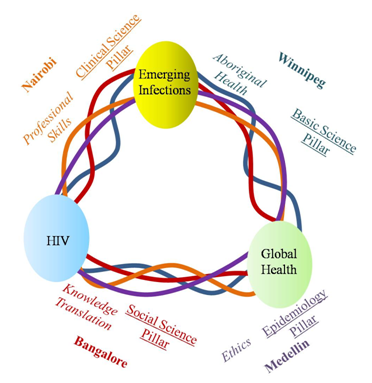
With
the steady increase in globalization of tourism, trade
and immigration, and
the ever changing
physical environment due to global warming and development,
there is an ever increasing risk of the global spread of
infectious disease. This is evidenced by the SARS outbreak
in 2003(1-3), the ever-present threat of pandemic influenza
(4, 5) and multi-drug resistant tuberculosis(6). The efforts
to develop an effective HIV vaccine were dealt a major
setback when the STEP trial was halted early due to more
HIV infections
in the vaccine arm of the study. Despite the frustration
with the lack of progress, Sekaly and Fauci have noted
that now is the time to focus even more closely on a basic
understanding
of models of HIV prevention and control and creative new
approaches are needed (7, 8). As with most infectious diseases,
those most at-risk are often marginalized populations,
typically with poor or no access to health care, including
those in
Aboriginal communities and the poor in developing nations(9,
10). It has become apparent that the complexity of pathogen
replication and disease transmission mimics the complex
nature of societies and researchers must be developed who
appreciate
those complexities and can work together to find solutions.
To develop researchers who will have the skills to meet
these growing challenges, we seek to renew the International
Centre
for Infectious Diseases (ICID) Training Program (this time
called the International Infectious Disease and Global
Health [IID&GH] Training Program to better emphasize the worldwide
nature of the program). The IID&GH Training Program
will continue the use of a multidisciplinary approach to
address
the national and global spread of infectious diseases and
the impact that they have on global health. The areas of focus for the Training Program will be
• the greatest current infectious disease threat (HIV),
• potential new threats (emerging infections and microbial
resistance),
• how these threats impact the health of individuals in Canada
and throughout the world (Global Health).

Figure: Bead and braid model of the three foci and different set of themes
and of the International Infectious Disease and Global Health Training
Program.
The
IID&GH Training Program will establish training sites
at each of the University of Manitoba’s (UM) major
international research partners (Winnipeg; Nairobi, Kenya;
Bangalore, India;
and Medellin, Colombia) (International
Collaborating Academic Institutions).
Through a program of excellent research projects, research
practica, learning
visits and intensive multidisciplinary courses, the
trainees will not only learn about infectious diseases,
HIV prevention,
global health, ethics, Aboriginal health issues, knowledge
translation and clinical trials, but they will do so
at the various international training sites, alongside Canadian-based
and international mentors and trainees. The IID&GH
Training Program conceptualizes its approach to creating
that next
generation of multi-disciplinary researcher through
the “bead and braid” model (Please see Figure). The beads
are the
major research areas of investigation (HIV, emerging
infections and global health) and connecting them are
the four strands,
or themes, that flow throughout the program. There
are a number of these set of four themes such as the
academic
program
(Aboriginal Health, Ethics, Knowledge Translation and
Professional Development), the research pillars of
CIHR (Basic, Clinical,
Social and Epidemiology) and the training sites (Winnipeg,
Nairobi, Medellin and Bangalore). Each of these themes
will be woven together and linking the major research
foci.
|

